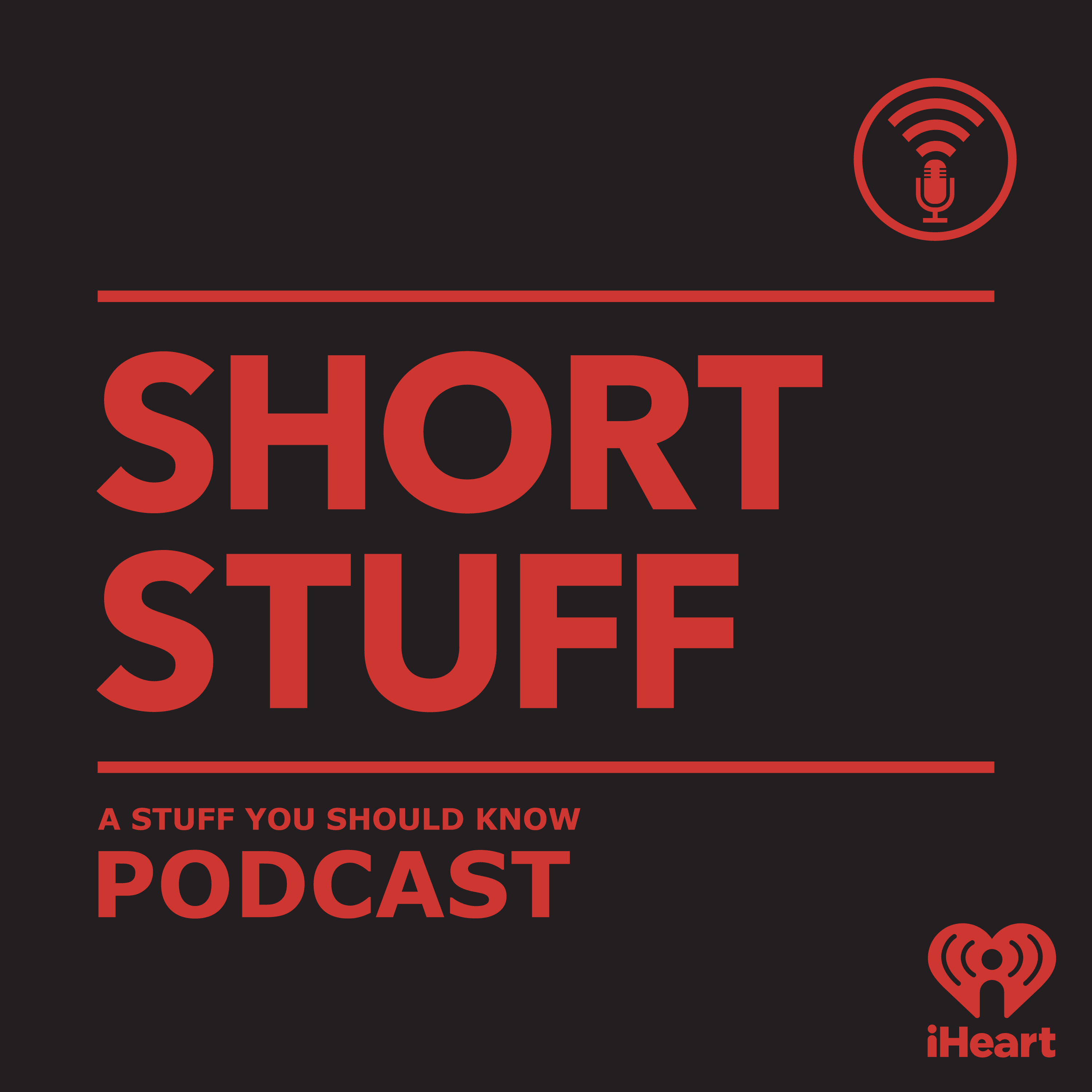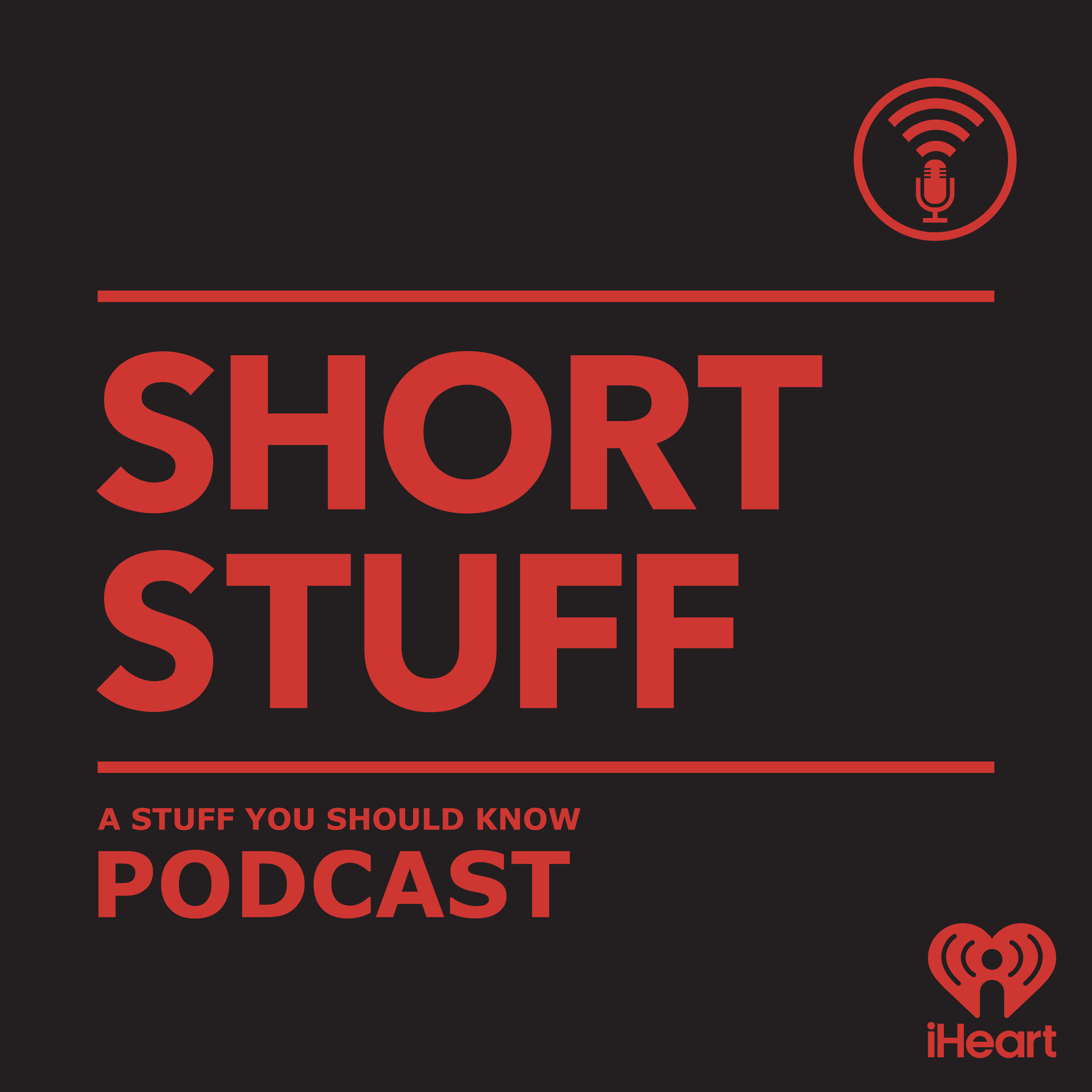Short Stuff: Bourgeoisie
Bourgeoisie is more than a word. It means something different depending on when and where it's being used.
See omnystudio.com/listener for privacy information.
Press play and read along
Transcript
Speaker 1 This is an iHeart podcast.
Speaker 2 Living with a rare autoimmune condition comes with challenges, but also incredible strength, especially for those living with conditions like myasthenia gravis or MG and chronic inflammatory demyelinating polyneuropathy, otherwise known as CIDP.
Speaker 2 Finding empowerment in the community is critical.
Speaker 2 Untold Stories, Life with a Severe Autoimmune Condition, a Ruby Studio production in partnership with Argenix, explores people discovering strength in the most unexpected places.
Speaker 2 Listen to Untold Stories on the iHeartRadio app, Apple Podcasts, or wherever you get your podcasts.
Speaker 3
Hello, and welcome to the short stuff. I'm Josh, and there's Chuck and Jerry sitting in for Dave.
So it's short stuff,
Speaker 3 you basic person.
Speaker 3 You call me bougie?
Speaker 3 Yeah.
Speaker 3
No, I'm not. I wouldn't do that.
I think it's kind of a mean thing to say to somebody, at least in America. In France, they're like, yes, you're right.
Thank you. In America, it's a bit of a put-down.
Speaker 3 That's right.
Speaker 4 And that's what we're talking about today. We're talking about a word,
Speaker 3 bourgeois.
Speaker 3 B-O-U-R-G-E-O-I-S.
Speaker 3 Yeah.
Speaker 4 Not to be confused with bourgeoisie, correct?
Speaker 3
Well, yeah, they're very closely related. Bourgeois can mean a, it can be an adjective and a noun.
Right. If it's a noun, you're talking about one person who is bourgeois.
Speaker 3
So that's their behavior, or it's the one person. Bourgeoisie is all of the people who are bourgeois.
It's a noun only. Okay, everybody.
There's going to be a quiz at the end of this episode.
Speaker 4 But
Speaker 4 if you talk to Americans, a lot of Americans probably hear bourgeois and they think, oh, fancy, fancy, fancy. Right.
Speaker 4 And that is not the case because bourgeois refers to, like you called me, basic, so sort of a middle-class basic individual.
Speaker 3
Yes. Or group of individuals.
Right.
Speaker 3 But
Speaker 3 there's a long road between the original version of bourgeois that we'll talk about and then the American version that it has now. And right smack dab in the middle are the commies,
Speaker 3 specifically Karl Marx.
Speaker 3 I don't understand why Joseph Engels never gets his due because he and Marx wrote the Communist Manifesto, but it's always just Karl Marx, Karl Marx, you know, must drive Engels crazy.
Speaker 3
But in 1848, they published the Communist Manifesto. And in that, they adopted the word that had formerly been middle-class people.
It wasn't really much of a put-down.
Speaker 3 It was just a useful word for a while.
Speaker 3 He equated them with the people who owned the capital that the labor was produced on and decided that they were exploiting the proletariat, the working class, right?
Speaker 4
That's right. And he was writing in German, so of course he did not say bourgeois.
He said Berger Liche, Gesellschaft.
Speaker 4 And English.
Speaker 3
You make German sound beautiful, Chuck. Thank you.
Donkey.
Speaker 4
In America, they may translate that as civil society or maybe a bourgeois society. But either way, you slice it.
What he's saying is the bourgeoisie are the bad people.
Speaker 3
They're exploitive. They're not actually doing anything.
They just own the stuff that the people who are actually doing something are using to do the thing that they're doing.
Speaker 3 But really, the bourgeoisie are the ones who are making the money off the working class and their labor, right?
Speaker 3 So it was not, it was not,
Speaker 3 at this time, it was not viewed as a very popular or
Speaker 3 it wasn't it wasn't praise. How about that? No one ever used it for praise by this time.
Speaker 3 And when it finally crossed the Atlantic to America America around the early 20th century, the Wobblies, the industrial workers of the world,
Speaker 3 who were, I believe,
Speaker 3 we talked about them before, and they were split between communists and anarchists. And there was a big struggle, I think, between the two.
Speaker 3 But regardless of whether you were a communist or an anarchist at the beginning of the 20th century, you were not a fan of the bourgeoisie.
Speaker 3 And yeah, so the Wobblies did not like the bourgeoisie either. And they, in fact, came up with a new slang term for them.
Speaker 4 That's right. The slang word was bourgeois, B-U-S-H-W-A.
Speaker 4 And what's weird, I think that was in a quote from a 1970 article. What's weird, though, is that that word, bourgeois,
Speaker 4 eventually was sort of morphed into a slang for BS, like somebody's full of hot air or BS, someone is full of bourgeois. Right.
Speaker 3 We have to thank our friends at the Grammar Phobia blog for digging that stuff up. That's right.
Speaker 3 And then, so it also kind of morphed in a new way,
Speaker 3 kind of the way that
Speaker 3 we view it today, but
Speaker 3 a little, yeah, I guess it was pretty much the way we view it today. Um, the it first pops up in black culture where it kind of morphed, um, thanks to Gladys Knight and the pips.
Speaker 3 They had a disco hit in 1980 called Bougie Bougie.
Speaker 4 And um, can we hear a snippet?
Speaker 3 No, we can't, unfortunately. But if you want to hear any of the song Bougie Bougie, you can find it on YouTube or just about anywhere where you can listen to it free and clear.
Speaker 3 But it's a great song, and I strongly recommend people go listen to it.
Speaker 4 Yeah, and that would be B-O-U-R-G-I-E comma B-O-U-R-G-I-E.
Speaker 3 Right. And the whole point of the song is it's about somebody who comes from the working class or a poorer background, but started to make money, and now they're flaunting it.
Speaker 3
They have like a a new car with a sunroof. They have new clothes.
And
Speaker 3 it was a commentary on them, but also kind of like a snide one, too. Like,
Speaker 3 these people are being tacky in a way and forgetting who they are or where they come from, I guess.
Speaker 4 Yeah, and it's kind of like that new money, old money thing, which is just so,
Speaker 3
you know. Yeah.
I say we take a break, Chuck. Yes, I was about to say that.
That's right.
Speaker 4 Attention, parents and grandparents. If you're looking for a gift that's more than just a toy, give them something that inspires confidence and adventure all year long.
Speaker 4 Give them a Guardian bike, the easiest, safest, and number one kids' bike on the market.
Speaker 2 Yeah, with USA-made kids-specific frames and patented safety technology, kids are learning to ride in just one day with no training wheels needed.
Speaker 2 It's why Guardian is America's favorite kids' bike and the New York Times and Wirecutters' top pick three years in a row.
Speaker 4 That's right. My daughter has a Guardian bike and she loves it, and that thing was really easy to put together.
Speaker 4 And get this, this holiday season, Guardian is offering their biggest deal of the year, over 40% in savings on all bikes plus $100 in free accessories.
Speaker 4 Guardian bikes have become one of the most sought-after gifts of the season and inventory is going fast, so don't wait. Join over a half a million families who've discovered the magic of Guardian.
Speaker 4 Visit guardianbikes.com to shop now.
Speaker 2
With PayPal. No fees, no interest.
And this limited time offer is perfect for the Black Friday and Cyber Monday deals you've been eyeing. Save the offer in the app now.
Speaker 2 So whether you're shopping for your foodie friend or outdoorsy uncle, PayPal helps you make the most of your money this holiday.
Speaker 3
Expires December 8th. See PayPal.com slash promo terms.
Subject to approval. Learn more at paypal.com slash payin4.
PayPal Inc. NMLS 910457.
Speaker 3 Burning stuffed with Joshua
Speaker 3 Chars.
Speaker 3 Stop your shoulders.
Speaker 4 So if you want to go back to the original bougie, if you want to go back to France, the original meaning is from a French word, B-O-U-R-G, which I guess would that be burg?
Speaker 3 Yeah, kind of like burg on the end of a town.
Speaker 4 Okay.
Speaker 4 And that's like a small town or a small market. In the Middle Ages,
Speaker 4 the people that lived there sort of adopted that name for themselves. So it kind of, this word is just morphing and morphing all over the place over the years.
Speaker 4 They were one step up from like a farming peasant. So they were sort of the middle class of the time.
Speaker 3 Right.
Speaker 3 Which is just the way that it was. Again, I said it was like a useful word, it wasn't like a put-down, it wasn't like a compliment, it was like you are bourgeois.
Speaker 3 That's that's that's the descriptor, yeah, right, very nice.
Speaker 3 Um, and it wasn't until the 17th century, specifically I think in 1670, when Molière, the French playwright, uh, came up with a musical comedy, uh, he was hilarious called um La bourgeois
Speaker 3 gentel homme, or the bourgeois gentleman. Um, and this is when it takes bourgeois and makes fun of it.
Speaker 3 Moliere was punching down to the middle class and essentially doing the exact same thing that Gladys Knight and the Pips were doing with Bougie Bougie.
Speaker 3 He was basically making fun of some middle-class social climber who was trying to make a name for himself in French society.
Speaker 4 That's right. And that would be the definition that is most sort of thought of today in the 21st century.
Speaker 4 when someone says bougie uh another you know modern musical example is atlantis own
Speaker 4 from the atl migos you ever listen to me gos oh yeah it's good stuff um they have a song called bad and bougie in this case spelled b-o-u-j-e
Speaker 3 and it sort of leans back on that uh what the pips were talking about um sort of a new fancy lifestyle yes but two two things were different one um the migos made their money um cooking crack in a crock pot, which is a proprietary eponym.
Speaker 3
And usually there was an Uzi in the same room too. And two, they were proud of being bougie and all the new money and tacky ways that they threw it around.
Like that was the thing.
Speaker 3
It wasn't a put down. They were like, yeah, I'm bougie.
You should have seen the money I had before. And now look what I got.
Speaker 4 Yeah, yeah, totally.
Speaker 3 It was a great song. Yeah.
Speaker 3 Okay, so that's where we are today. Bougie, it's essentially a put-down, depending on whether you've you've claimed it yourself.
Speaker 3 If most of the time, if you're calling someone bougie in America, you're basically saying, like you said at the outset, they're basic.
Speaker 3 Their lifestyle and their life is just kind of boring and pedestrian in the middle of the road and what's the point kind of thing. Usually it's from somebody who,
Speaker 3 well, they're just being mean, essentially, right?
Speaker 3 Yeah. But in France, that's not the case.
Speaker 4 Yeah, in modern France, it does not mean pedestrian.
Speaker 4 It's a little more like good, well-mannered, well-educated.
Speaker 4 There's like three levels, supposedly, of a Parisian bourgeois.
Speaker 4 The nobility or people that are kind of close to nobility or the rich or the creme de la creme.
Speaker 4 You have the bourgeois de provence,
Speaker 4 doctors, attorneys, middle-class types. And then the petite bourgeois who are, you know, shopkeepers, artists,
Speaker 4 you know, kind of self-starting, self-employed people.
Speaker 3 Yeah. And even though there seems to be a bit of a hierarchy to it, they all are, they're behaving the same way.
Speaker 3 I think it just depends on how much money you have is what it's really kind of carved out between.
Speaker 3
But the bourgeois in France is exactly what Americans who don't know what bourgeois means think of. They're correct, but they're just thinking specifically of the French bourgeois.
Yeah.
Speaker 3 And yeah, I guess that's about it for being bougie and bourgeois and bourgeoisie and Karl Marx and Joseph Engels and Migos and Gladys Knight and the whole lot of it, Chuck.
Speaker 4 Well, we'll follow up in 10 years and see if the definitions changed again.
Speaker 3 Great idea. In the meantime, Short Stuff is out.
Speaker 1 Stuff You Should Know is a production of iHeartRadio. For more podcasts from iHeartRadio, visit the iHeartRadio app, Apple Podcasts, or wherever you listen to your favorite shows.



